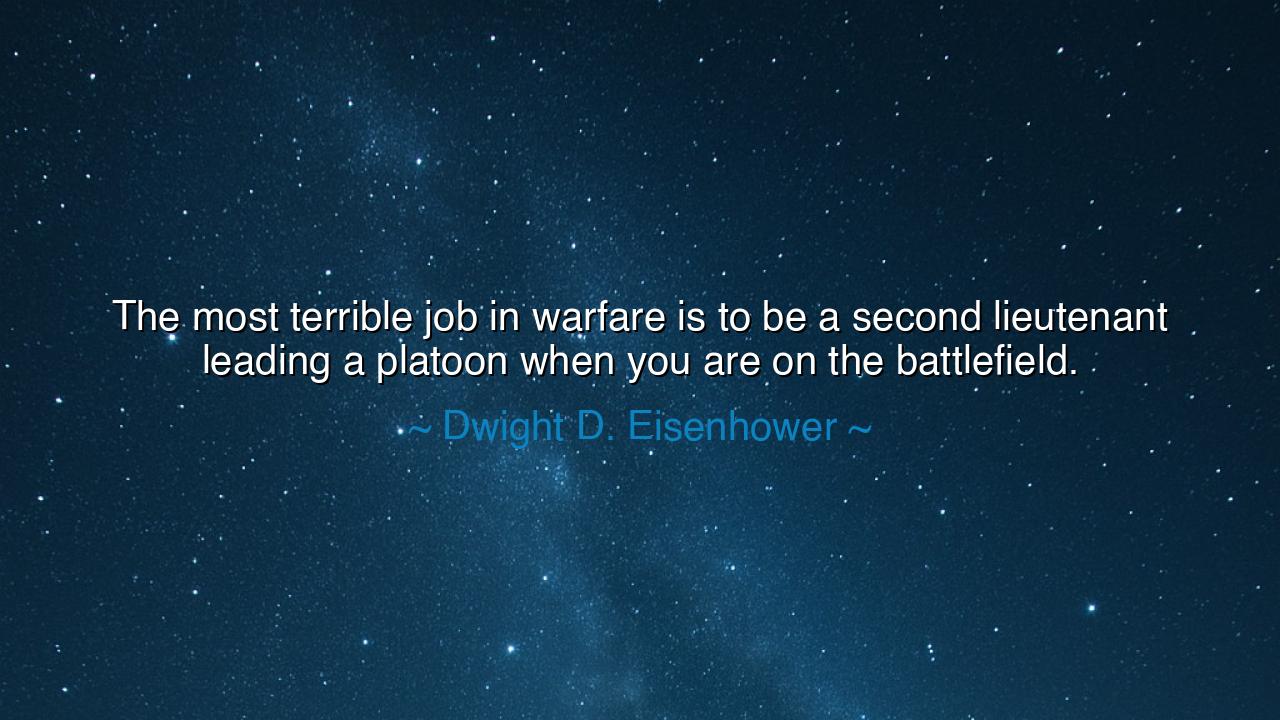
The most terrible job in warfare is to be a second lieutenant
The most terrible job in warfare is to be a second lieutenant leading a platoon when you are on the battlefield.






In the solemn and reflective words of Dwight D. Eisenhower, soldier, commander, and later president, we hear a truth born not from theory but from the harsh experience of war: “The most terrible job in warfare is to be a second lieutenant leading a platoon when you are on the battlefield.” These words, uttered by a man who once commanded the greatest armies of the twentieth century, do not glorify war—they reveal its heavy burden. Eisenhower, though he rose to the highest ranks of power, never forgot the weight borne by the lowest leaders—the young, untested officers who must stand between chaos and courage. His words carry the reverence of a general for those who face death not in maps and meetings, but in mud and blood.
The origin of this quote lies in Eisenhower’s deep understanding of the structure of war and the human heart within it. Before he became the Supreme Commander of the Allied Forces in World War II, he was a soldier and a student of leadership. He had seen, in the trenches of Europe and in the deserts of North Africa, the faces of those who carried the true weight of command—the second lieutenants, barely older than boys, leading thirty or forty men into the fury of battle. He knew that while generals move divisions on a map, it is the platoon leader who must look into the eyes of his soldiers and tell them to advance through fire. It is he who must make life-and-death decisions in seconds, with no time to consult or retreat.
To call this the most terrible job in warfare is not to diminish the suffering of others, but to acknowledge the singular agony of responsibility. The second lieutenant is young, often newly commissioned, and yet he must lead veterans hardened by combat. He must balance obedience to orders with care for his men, courage with caution, decisiveness with mercy. Every choice he makes is magnified by consequence. If he hesitates, his soldiers may die; if he is reckless, they may die all the same. This burden—of command without experience, of youth faced with mortality—makes his role uniquely tragic. He stands at the narrow bridge between leadership and sacrifice.
History has shown us countless examples of this truth. On D-Day, when Eisenhower sent thousands of soldiers across the beaches of Normandy, it was the young platoon leaders who bore the first and fiercest blows. Many never reached the sand. Second Lieutenant Robert Mathias, for instance, of the 82nd Airborne Division, was the first American officer killed in the invasion of Normandy. Barely twenty-three years old, he led his men from the door of the plane even after being mortally wounded. His last act was to shout for his paratroopers to jump. In that instant, he embodied Eisenhower’s words—the terrible, noble duty of leading others through the gates of death.
Eisenhower’s quote is not only about the battlefield; it is a mirror held to all leaders in times of crisis. The second lieutenant represents the moment when ideals meet reality, when training meets terror, when theory meets the cry of the human soul. He cannot rely on distance or detachment; he must act in the immediacy of danger. And in that immediacy, leadership is stripped bare—it becomes not a title, but a test of character. The same is true in every field of life. The truest leaders are those who step forward when fear reigns, who guide others not from comfort, but from within the storm itself.
But there is another meaning hidden within Eisenhower’s words—a deeper compassion. The general who commanded millions never forgot the individual. He understood that victory is not measured only in triumphs, but in the silent courage of those who fight unseen. The platoon leader, standing with trembling hands yet steady heart, is the soul of every army, the one who translates the vast machinery of war into human will. By honoring his suffering, Eisenhower reminds us that even in the grandest of endeavors, the true cost of glory is paid in the quiet bravery of the small and the humble.
So, my children, take this wisdom into your own battles, whether they be of war or of life. Do not fear responsibility, even when it feels unbearable. Stand firm when you are called to lead, for courage is not the absence of fear, but the triumph over it. Remember that the higher your duty, the heavier your burden—but also, the greater your purpose. The “terrible job” of leadership is not reserved for soldiers alone; it is the task of every soul who dares to guide others toward the good, even through pain and uncertainty.
For in the end, Eisenhower’s words are not merely about war—they are about the essence of service. The world will always need those who step forward, who bear the weight of decision when others falter. The leader who faces the storm with resolve, who carries others through darkness, knows—like the young lieutenant—the true strength of courage. And though the task is terrible, it is also sacred. For in every generation, it is through such souls that humanity finds its way through the battlefield of life and into the light of peace.






AAdministratorAdministrator
Welcome, honored guests. Please leave a comment, we will respond soon